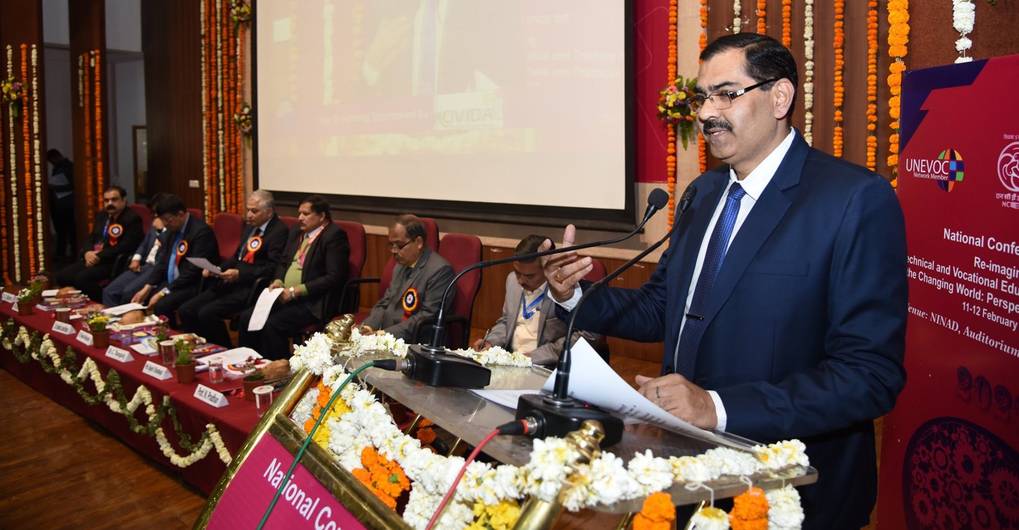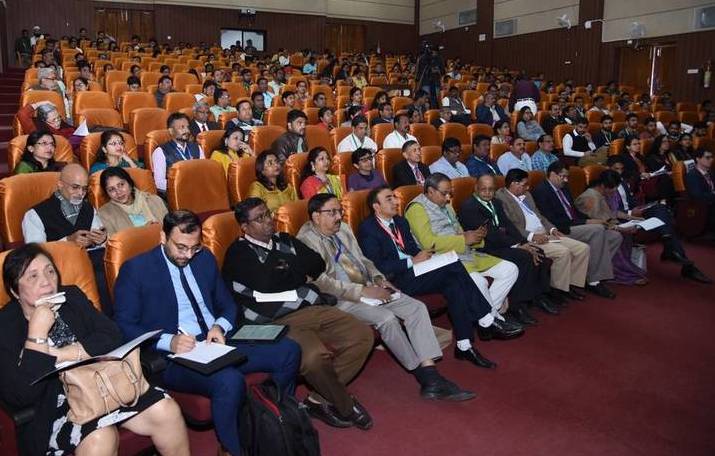Pandit Sundarlal Sharma Central Institute of Vocational Education (PSSCIVE) organised a 2-day National Conference on “Reimagining Technical and Vocational Education and Training for the Changing World: Perspectives and Practices” on 11th and 12th February 2020 in the PSSCIVE campus, Bhopal.
The conference was attended by TVET administrators, policymakers, officials from various Ministries, researchers, academic professionals, representatives and experts from various Sector Skill Councils, national and international organizations, teachers, vocational trainers, students, practitioners, and other stakeholders.
The 2-day conference began with an Inaugural Session, where opening remarks were made by Dr. Rajesh Khambayat, Joint Director, PSSCIVE. Special remarks were made by Professor N. Pradhan, Principal, Regional Institute of Education, Bhopal; Dr. C. Thangaraj, Director, NITTTR, Bhopal, and Dr. Ramhari Lamichhane, Director General, Colombo Plan Staff College, Manila, Philippines. The Chief Guest for the session was Dr. Shyamal Majumdar, Former Head, UNESCO-UNEVOC International Centre, Bonn Germany. Vote of thanks for the inaugural session was given by Dr. Kuldeep Singh, Conference Coordinator, PSSCIVE, Bhopal.
The National Conference on reimagining TVET for the Changing world was strategically divided into themes relevant in the current times. The themes in the conference were – emerging perspectives in the future of work, transforming TVET for Industry 4.0, upskilling and reskilling of today’s workforce and TVET teachers development for Industry 4.0, TVET excellence and innovation, TVET for rural transformation and SDG 2030 implementation, future agenda for TVET and cross-sharing of experiences, best practices and approaches of TVET excellence.
 In the Keynote Session on emerging perspectives in the future of work, Dr. Shyamal Majumdar presented the major trends impacting the future of jobs and a new vision for TVET in the 21st century. Dr. Shyamal Majumdar said the 4th Industrial revolution or Industry 4.0 will create disruptions in our lives. But any new innovation or technology will first create disruption and then lead to transformation, added Dr. Majumdar. In the same session, Dr. Ramahari Lamichhane spoke on TVET for Global Competitiveness: Need for 21st Century.
In the Keynote Session on emerging perspectives in the future of work, Dr. Shyamal Majumdar presented the major trends impacting the future of jobs and a new vision for TVET in the 21st century. Dr. Shyamal Majumdar said the 4th Industrial revolution or Industry 4.0 will create disruptions in our lives. But any new innovation or technology will first create disruption and then lead to transformation, added Dr. Majumdar. In the same session, Dr. Ramahari Lamichhane spoke on TVET for Global Competitiveness: Need for 21st Century.
- Every innovation creates disruption before it leads to transformation
- Social innovation, the innovation pushed by society is more sustainable
- Students in the colleges must be prepared for the technologies not yet invented
- Mere occupational skills will not be enough. Transferable skills along with foundational and occupational skills are required to remain employable and supply the demand
- Domain independent skills like interpersonal skills, adaptability, creativity, and cognitive skills are needed along with the right attitudes, values, and work habits.
- TVET systems must be seen under the economic lens, equity, and transformational lens.
- Greening TVET – We should develop skills for green jobs and greener society
- Innovative TVET – Every school must have a training center for innovation and entrepreneurship
- We should focus on the “selection” of students for the specific field but not “collection” of students.
- We should prepare our students, teachers and the infrastructure for Industry 4.0.
The Keynote session was followed by Technical Session – I: Transforming TVET for Industry 4.0. The session was chaired by Jan Ebben, Consultant, NSDC, New Delhi. The speakers in the session were Dr. Romulita Alto, Research Consultant, Colombo Plan Staff College, Manila, Philippines; Dr. Pramod B. Shrestha, Professor, Institute of Engineering Tribhuvan University, Kathmandu, Nepal; Dr. Swati Mujumdar, Director, Symbiosis Centre for Distance Learning Symbiosis University of Applied Sciences, Indore, and Mr. Basab Banerjee, International Vocational Skills and Recruitment Specialist SkilIndiGlo, Noida. The speakers presented on “a Prologue to TVET 4.0 and Responding to the Challenges of Industry 4.0: Perspectives for Policy Formulation, Disruptive Innovations in the TVET Eco-System: Challenges Opportunities, Building Skills for Work and Life, Making Indian Youth Ready for International Markets”, respectively.
Characteristics of a good TVET system includes
- An up-to-date curriculum
- Practical training
- A holistic learning environment with good infrastructure equipped with all the required tools and technologies
- Provide widely recognized standards which also allows students to change educational tracks
- Availability of a sufficient number of quality trainers
- Creating a positive image of vocational education, so that young people find it attractive
The technical session was followed by a Panel discussion on the Up-Skilling and Re-Skilling of Today’s Workforce and TVET Teachers Development. The session was chaired by Dr. Nilesh Khare, Professor, Jagaran Lakecity University, Bhopal. The panelists were Prof. Siddharth Chaturvedi, Director, AISECT; Mr. James A. Raphael, CEO, RASCI; Vinesh Menon, CEO, Ampersand Group; Prof. Ajit Kumar Padhi, Director, IT-ITES Sector Skill Council NASSCOM; Mr. Jagdish Acharya, CEO, Paints & Coatings Skill Council; Mr. Satender Arya, CEO, Agriculture Skill Council of India among others.
 Technical session – II: Good practices of TVET in India followed the panel discussion. The session showcased some of the personalized experiences in coping with rapidly changing industry, demand for new skills, new curriculum designs, National occupation standards, innovative ideas, etc. The session was chaired by Dr. Pramod B. Shrestha, Professor, Institute of Engineering Tribhuvan University, Nepal. In the session, the case study of TISS-SVE on work-integrated training of vocational education was presented by Dr. Leena Wadia, Senior Fellow at Observer Research Foundation, Mumbai. Mrs. Renuka Raju, Managing Director, Kovida, Hyderabad, spoke on Professional standards for educators in TVET. Mr. Sunil Dahiya, Executive Vice President, Wadhwani Foundation pointed out the importance of employability skills for employment. Apprenticeship Training for Career Development was presented by Dr. P.N. Jumle, Director, Board of Apprenticeship Training (Western Region), Mumbai. Mr. Abhishek Gupta, National Project Manager, AISECT, focussed on Promoting Skills for Social Inclusion: An Experience and Perspective.
Technical session – II: Good practices of TVET in India followed the panel discussion. The session showcased some of the personalized experiences in coping with rapidly changing industry, demand for new skills, new curriculum designs, National occupation standards, innovative ideas, etc. The session was chaired by Dr. Pramod B. Shrestha, Professor, Institute of Engineering Tribhuvan University, Nepal. In the session, the case study of TISS-SVE on work-integrated training of vocational education was presented by Dr. Leena Wadia, Senior Fellow at Observer Research Foundation, Mumbai. Mrs. Renuka Raju, Managing Director, Kovida, Hyderabad, spoke on Professional standards for educators in TVET. Mr. Sunil Dahiya, Executive Vice President, Wadhwani Foundation pointed out the importance of employability skills for employment. Apprenticeship Training for Career Development was presented by Dr. P.N. Jumle, Director, Board of Apprenticeship Training (Western Region), Mumbai. Mr. Abhishek Gupta, National Project Manager, AISECT, focussed on Promoting Skills for Social Inclusion: An Experience and Perspective.
The day – 2 of the National Conference started with a technical session on TVET Excellence and Innovation. The session was chaired by Dr. Herve Huot-Marchand, Chief of the section for Youth, Literacy and Skills Development UNESCO Paris. The session elaborated on various strategies adopted and actions taken by the National and International agencies including UNEVOC centers to increase the opportunities for productive work, sustainable livelihoods, personal empowerment, and socio-economic development. The speakers discussed different training methods in their respective countries and systems and models developed by them for the acquisition of knowledge and skills for the world of work and entrepreneurship. The speakers in the session were Mr. Rikardo Lamadrid Intxaurraga, Director, Technology, and Advanced Learning, Basque Government, Spain (UNEVOC Network Member); Dr. Tuukka Soini, Chief Development Officer, Joint Authority of Education in Espoo Region Omnia Vocational College, Finland (UNEVOC Network Member); Mr. Jan Ebben, Consultant, National Sill Development Corporation, New Delhi, India; Dr. Vinay Swarup Mehrotra, Professor, PSSCIVE, Bhopal, India (UNEVOC Network Member), and Mr. Manish Joshi, TVET and Higher Education Specialist, UNESCO, New Delhi, India.
For transforming TVET through Excellence
- There should be continuous policy development
- Capacity building of the trainers and students
- Practice sharing and cross-learning
- Create dynamic systems that prosper in changing environments
- Through partnerships and network, ensure that training, qualifications, productive sectors and job market are progressing in coordination
- Instead of gaps, there must be bridges between the world of work and vocational education and universities
Technical session -III was on TVET for Rural Transformation and SDG 2030 implementation. This session pointed out how TVET can support rural transformation through capacity building of rural youth for various farm and non-farm activities and emerging employment opportunities. The speakers in the session were, Dr. Inigo Araiztegui, International Manager, Tknika, Spain (UNEVOC Network Member); Dr. Rajesh P. Khambayat, Joint Director; Dr. Shyamal Majumdar; Dr. Noor Naqschbandi, Programme Director, German Society for International Cooperation (GIZ), India; Dr. G. V. Krishna Pabsetti, Chief Executive Officer, Green Ecowater Systems, Hyderabad; Mr. Ashok Talluri, C.E.O, Aquaponics and SDGs; and Dr. B. K. Dutta, Director, Vivekananda Institute of Biotechnology, Kolkata.
Related Article: Dr. Rajesh Khambayat speaks about the upcoming National Conference on Re-imagining TVET for the Changing World – Read more: https://nationalskillsnetwork.in/dr-rajesh-khambayat-speaks-about-the-upcoming-national-conference-on-re-imagining-tvet-for-the-changing-world/
The next session was on the Future agenda for TVET. The session focussed on rebranding TVET, reforming vocational and technical education in India and various challenges for skill development in India. The speakers of the session were, Dr. Thanika Chalam Vedhathiri, Prof. (Retd.), NITTTR, Chennai; Dr. V. P. S. Raju, Assistant Professor, National Institute of Education Planning and Administration, New Delhi; and Dr. J. S. Saini, Professor, NITTTR, Chandigarh.
Future agenda for TVET would be
- Vocational education must be part of holistic education
- We should map local opportunities
- Gaps must be identified and disparities must be reduced
- Should link NSQF to higher education
- Women labor force must be increased
- Labor market must match the youth aspirations
- Aspirational jobs must increase
The last session in the 2-day National Conference on reimagining TVET was on Good practices in TVET in India. The speakers of the session were Ms. Nilanjana Saxena, Learning Design Professional, Higher Education Institution, Singapore; Dr. R. S. Rathore, Dean, Academic Affairs, Shri Vishwakarma Skill University, Haryana; and Dr. Madhuri Dubey, Founder, National Skill Network, Hyderabad. They spoke on skills for new-age vocational teachers, implementing apprenticeship through industry integrated dual education model, and empowering youth through skills: success stories, respectively.
During the closing ceremony of the conference, Dr. Rajesh P. Khambayat thanked all the stakeholders and participants for being part of the conference. He also announced the release of the event report – “Bhopal Declaration”. Which contains all the points put forward by the speakers from various national and international agencies for reimagining the TVET in the changing world, various perspectives, and practices. We at NSN believe that the conference was a grand success and one-of-its-kind. As the conference provided a platform for various stakeholders in the domain of skill development and vocational education to share each other’s innovative ideas and best practices, suggestions, and recommendations for affirmative actions in improving TVET and also for being the means of networking among institutions and participants in the TVET.












